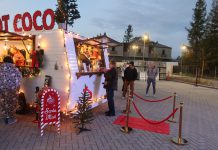The SMART train is back on track following recent weeks of
funding worries, proposed delays and muddled deliberations by
project leaders that sometimes resembled a verbal train wreck.
The “off-again, on-again” plotting was triggered by a
SMART advisory committee’s findings that the project was falling at
least $155 million behind revenue projections for the $590 million,
70-mile commuter train and adjoining trail system through Sonoma
and Marin counties.
In late January SMART staff proposed a “pay as you go” strategy
that would have divided the project into two phases, completing a
Marin to Petaluma phase two years ahead of a final Sonoma County
phase north to Cloverdale.
After much public outcry from SMART critics, supporters and
local elected leaders, the SMART board reversed an earlier vote and
on Feb. 17 voted to re-affirm going forward with the original
70-mile project and re-committing to a completion date of 2014.
“This is very much a work in progress, SMART board chair Debora
Fudge, also a Windsor Town Council member, told a Windsor Chamber
of Commerce luncheon crowd the same day. “Things are changing every
day.”
Faced with a “crashed economy” that has created a shortfall in
expected sales tax revenues and delayed bond sales, Fudge said the
project “has not slipped on its timeline at all.”
In fact a series of community meetings were concluded last week
on design elements for the diesel engine cars and also for the
design and location of the 14 proposed passenger stations.
Station design meetings were held in Windsor, Healdsburg and
Cloverdale as well as in Santa Rosa and San Rafael.
Zimmer Gunsul Frasca Architects of Oregon led the station
workshops and plan on finalizing station designs and bid packages
by the end of summer.
Actual rail construction is scheduled to begin next year and the
rail car design and construction will be launched just before
that.
The first trains are expected to roll in 2014 and attract a
daily ridership of 5,000 passengers.
The SMART system is being paid by a quarter percent sales tax
(Measure Q) approved by Sonoma and Marin voters in 2008. Annual
rider fares are expected to total $8 million.
The now-quashed suggestion to divide the SMART construction into
two phases was aimed at securing specific-use federal funds
unavailable to the larger project. When required support from the
Metropolitan Transportation Commission (MTC) was not won and the
public outcry made news, the SMART directors backtracked to the
original schedule and plan.
“Every day the situation is different,” Fudge told the chamber
gathering. “But we are not committing to shortening the rail line.
Nothing is set in stone; we are trying to be as nimble as we
can.”
Despite the MTC set back, Fudge said other federal funds in
smaller $20 and $30 million increments might become available in
the coming months.
Some critics of the SMART board’s turnaround votes charged there
is “no plan B.” Some of the residents at the Healdsburg meeting
asked why some of the elements like parking lots, landscaping and
other improvements couldn’t be phased in at a later time after the
trains are running.
The recent SMART controversy has become a poltical tussle in the
North County supervisor race where Fudge is being challenged by
Healdsburg City Councilmember Mike McGuire.
While maintaining his support for the commuter train project,
McGuire has been critical of Fudge and other SMART directors for
considering to limit or delay the project. McGuire is circulating a
petition on-line that, in part, calls for the SMART board to be
“more transparent.”
In response, Fudge has called McGuire’s tactics “cheap political
stunts.”








